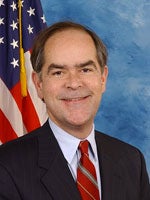Jim Cooper ’80, a Blue-Dog Democrat from Tennessee’s 5th congressional district, said that Congress is “deeply broken.”
Cooper offered that assessment in his lecture titled “Fixing Congress,” given at Harvard Law School and sponsored by the Safra Center for Ethics.
Harvard Law School Professor Lawrence Lessig, director of the Safra Center, said Cooper has “the perspective on Congress that is essential to understand the institution, its weaknesses, and how to restore a sense of its potential.”
Cooper, who spoke about how to improve the legislative branch, won re-election in November despite the conservative gains in competitive Congressional districts.
“I’ve been in Congress on and off for almost thirty years. But it’s not the decline that worries me; it’s that as the world’s only super-power we cannot afford to break down now.”
Echoing a serious warning cry among many congressional scholars like Norman Ornstein, Cooper said Congress is endangering the nation’s “capacity for self-renewal” by being “willfully blind to most of our nation’s major problems.”
“It’s a grim diagnosis…but there’s still time for a cure, not much time.”
Among the most pressing issues Congress has neglected, said Cooper, is accurately defining the nation’s debt in mathematical terms. “The true national debt is many times larger than the published numbers—more like 50 than 15 trillion dollars.” He said another fundamental concern was the American tax system: “Never has America been in greater need of tax reform.”
“The greatest disconnect in politics today,” Cooper said, “is the fact that these vital entitlement programs are not, as politicians claim, sacred commitments—they are scheduled benefits that we know today we don’t know how to fund. The sooner we … stabilize these programs, the more likely we can save them”
The Congressman also criticized the lack of oversight on insurance, which he alleges has become “the core business of the federal government.” He noted the dominance of “huge programs like Social Security, the VA, and federal subsidies for private insurance.”
In his speech, Cooper entertained a number of possible solutions to fixing Congress. He proposed working with universities and think tanks to devise a system of merit pay for members of Congress based on achievement. He also suggested creating incentives for representatives who repeal “obsolete legislation” to cut costs. Another “thought experiment” he suggested was to allow legislative candidates to only raise money from their local constituents.
